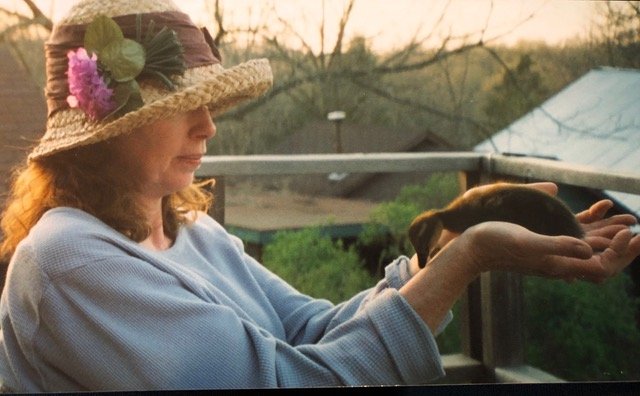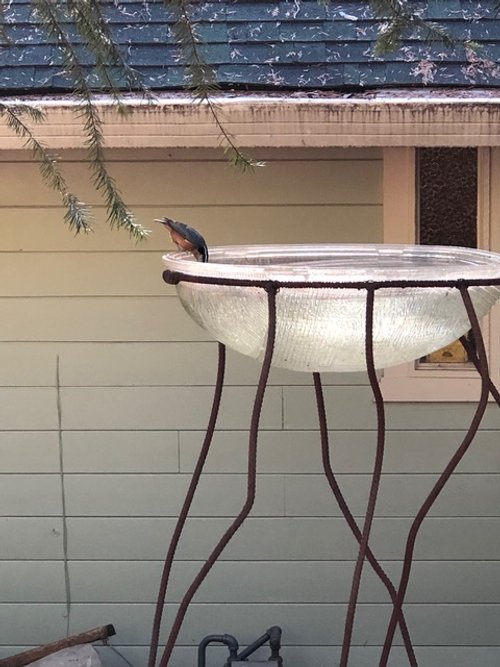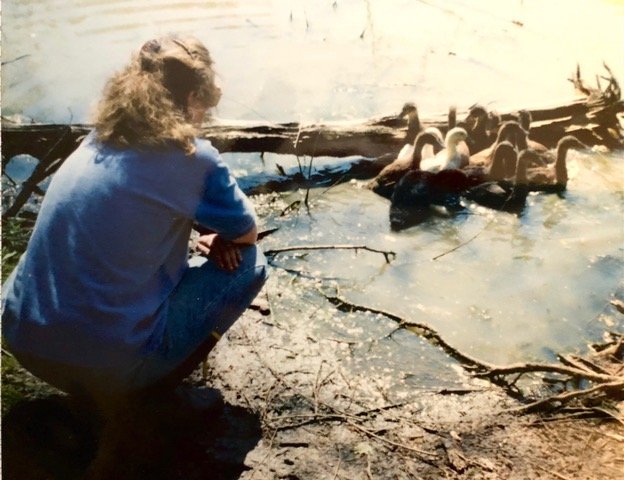Magic at Play
In life, there are moments that cannot be explained with logic or reason. They just are. Plain and simple, they are perfect little moments that come out of the blue and leave you breathless. Rare and otherworldly, they have the power to temporarily confound, momentarily confuse, and ultimately delight. When allowed, they bring joy. To experience what I think of as magic at play, you must first let go and allow yourself to embrace the moment underway.
Every morning, I fill a container with wild birdseed and walk up to a pathway I created along a wild edge of our property visible from our kitchen window. Long neglected and strewn with dead twigs and pinecones, I raked it into a graceful meditation path, gradually adding two benches, bird feeders, stone cairns, and a Thai spirit house. Rosemary, juniper, and a weeping blue Atlas cedar have been added here and there along the sides.
Whatever my task is at the kitchen sink, it’s my habit to gaze out the window at the gymnastics of ruby breasted nuthatches that now inhabit this peaceful pathway they’ve adopted as their own private feeding and bathing ground. Bushy tailed gray squirrels and chipmunk-sized Douglas squirrels fly from tree to tree, impatiently scolding me if I linger too long while filling their glass water bath.
On the cusp of my 77th birthday, I took time from my usual watering routine to sit awhile on our park bench and reflect on moments when I communed with nature and witnessed magic at play. While living at Breakfast Creek, I sat with Kit on a bench along an edge of our pond as a great blue heron flew directly overhead. Pencil thin and stealthy in flight, the heron is a solitary fisher bird.
That night the pond froze up tight as a zipper, all but a small corner. The following morning when I went down to break up the ice with a mule sledge and scatter corn for my ducks and geese that had overnighted there for safety, I surprised the heron that had hunkered down and fallen asleep at the edge of the opening in the ice. Startled awake, the heron ever so slowly extended its stick-like legs until it had doubled in size, then lifted its lanky frame into the air like a Star Wars creature taking flight. The moment was pure magic.
These glorious October afternoons, Kit and I sit in our Adirondack chairs facing the woods and watch the sun move on its westward trajectory toward dusk. As I read aloud from Gilbert M. Grosvenor’s recently published memoir, A Man of the World: My Life at National Geographic, we recall our own years as part of the Geographic family and our friendship with Gil. We met soon after he’d become president of NGS. He and Barry Bishop had envisioned expanding the Society’s mission to enhance the diffusion of geographic education in America—a vision that led Gil to Kit and ultimately took us to Washington, DC. to help him accomplish that mission.
Reading about Gil’s lifelong passion for conservation of the planet’s wildlife and natural treasures, I recalled the time over three decades ago when he visited us in Missouri for several days. While at Breakfast Creek, we took walks around the pond and woods that surrounded its edges. Ducks and geese grazed in the meadow near the pond. Ever an astute observer of nature, Gil noted there were no ducklings trailing behind their mothers. What, he asked, was the reason our free-ranging ducks and geese weren’t successful hatching their eggs in the wild.
I explained that each spring, I ordered a dozen or so day-old ducklings from a hatchery in Lebanon, MO and raised them in our heated chicken house until they feathered out, learned to swim in an enamel tub that I kept filled with water, and were then introduced to the pond. Without parenting, if they laid an egg in the meadow, they left it where it dropped.
After Gil returned to Washington, he promptly ordered an egg-hatching incubator and sent it to me via UPS. Shortly thereafter, I found four duck eggs unattended in a flowerbed that I knew would soon become “sitting ducks” for our neighbor’s egg-sucking black lab. After gathering them up, I marked each egg with an X to keep track of their pattern of rotation while they kept warm in the incubator in our sunroom.
Twenty-eight days later while I was in our library, I heard frantic peeping coming from the adjacent sunroom. One of the four eggs had hatched, and when the little duckling spotted me, it cried out “MOM!” in what I understood to be duckling speak. It was love at first sight. I named him “Gilbert,” and until the day came when I reluctantly introduced him to the ducks and geese on our pond, he followed me around the yard, waddling and quacking like the happy, web-footed toddler that he was.
Close encounters in the wild touch my spirit and leave me changed. In dark times, they fill me with hope and light. Long after they’ve become memories, I hear their voices still and am reminded — In nature, there is a world of magic at play.





